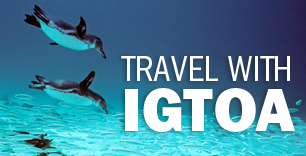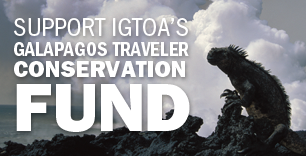Search
Tag Cloud
Subscribe
IGTOA Awards $80,000 in Galapagos Conservation Grants
Last month, IGTOA’s board of directors voted to award $80,000 in Galapagos Traveler Conservation Fund (GTCF) grants to four different non-profit organizations. IGTOA’s member companies and donations from visitors fund the GTCF, which provides critical financial support to those working on the frontlines of Galapagos conservation. Since 1997, IGTOA has awarded over $1 million in grants. We are proud to support the following organizations with GTCF grants this year:
Ecology Project International (EPI): Empowering Youth as Conservation Leaders in Galapagos, $25,000
The future of the Galapagos Islands ultimately lies in the hands of the people who live there, yet there is a fundamental disconnect between many Galapagos residents and the remarkable natural environment they inhabit. Fewer than 40% of Galapagos residents were born in the islands and a majority of residents have not had the opportunity to visit the national park. Furthermore, students in the Galapagos have traditionally lacked access to outdoor learning opportunities; education in Galapagos follows a traditional, classroom-based model, which fails to provide access to the spectacular, natural laboratory of Galapagos. We at IGTOA firmly believe that the most important thing that we can do to support Galapagos conservation in the long run is to help empower young people to become engaged and informed stewards of their own natural heritage. This is why we are proud to once again support the work of EPI, whose programs engage students in applied conservation programs that include field research and giant tortoise habitat restoration in partnership with the Galapagos National Park. In 2018, 170 Galapagos students will have the opportunity to participate in EPI’s programs. Since 2003, more than 1,700 students have participated in EPI’s programs.
Island Conservation: Floreana Biodiversity Heritage Community Campaign, $25,000
Floreana Island was the first Galapagos Island to be settled by humans (in 1832). This long history of human habitation has adversely affected the biodiversity and ecological health of the island. Species introduced by humans, such as rats and cats, are a principle reason why 10 Floreana species are listed as critically endangered, and 13 others have become extinct locally (gone from Floreana but present elsewhere in the archipelago). Cats, for example, prey upon Galapagos petrels, frigate birds, pelicans, boobies, finches, and mockingbirds as well as marine iguana and giant tortoise hatchlings. Island Conservation is spearheading an ambitious multiyear plan, the Floreana Island Restoration Project, which aims to extirpate feral cats, rats, and mice and restore much of the native biodiversity that has been lost from the island, including the Floreana giant tortoise and the Floreana mockingbird. In 2017, IGTOA’s grant of $25,000 helped Island Conservation advance written plans with the Floreana Parish Council, landowners, and occupants regarding biosecurity, pets, domestic livestock, and natural resources. Our 2018 grant will allow them to complete this work and move on to the next phase of this exciting and important project.
Charles Darwin Foundation (CDF): Ensuring Conservation Research and Complementary Activities at the Charles Darwin Research Station (CDRS), $20,000
Sound science is at the core of all successful conservation efforts in the Galapagos Islands, which is why IGTOA is proud to announce that it is awarding $20,000 in general operating funds to the CDF this year. Founded in 1959, the CDF operates under agreement with the Government of Ecuador and provides scientific knowledge and technical support to government institutions, including the Galapagos National Park, in order to help ensure the lasting conservation of the islands. The CDF operates the CDRS, the oldest, largest, and most successful scientific research institution operating in the Galapagos Islands. It is one of the most popular visitor sites in Puerto Ayora on the island of Santa Cruz. Over 100 scientists, educators, research assistants, support staff, and volunteers from all over the world take part in this effort. Ninety percent of the organizational staff is Ecuadorian, and the CDF is committed to providing training to residents of the Galapagos to become future scientists.
Darwin Animal Doctors (DAD): Vaccination Evolution in the Galapagos, $10,000
DAD has been providing free veterinary care, including humane pet sterilization procedures, in the Galapagos Islands since 2010. Since 2014 DAD has also been aggressively testing local pets for deadly invasive diseases and has confirmed the presence of parvo and distemper, which helped to convince Galapagos authorities to allow pet vaccinations into the islands for the first time. These diseases, if spread, could have the potential to wreak havoc on wildlife populations. Galapagos sea lions, for example, are susceptible to distemper and could be wiped out by an outbreak of the disease. In 2017, the Galapagos Biosecurity Agency invited DAD to aid them in acquiring, importing, and administering vaccines to dogs throughout the Galapagos, a historic and important step toward ensuring that deadly pet-borne diseases are kept under control. IGTOA is proud to award $10,000 to DAD in support of this exciting and important new endeavor. IGTOA awarded DAD a $15,000 grant in 2016 to help fund humane sterilizations of local pet populations.








